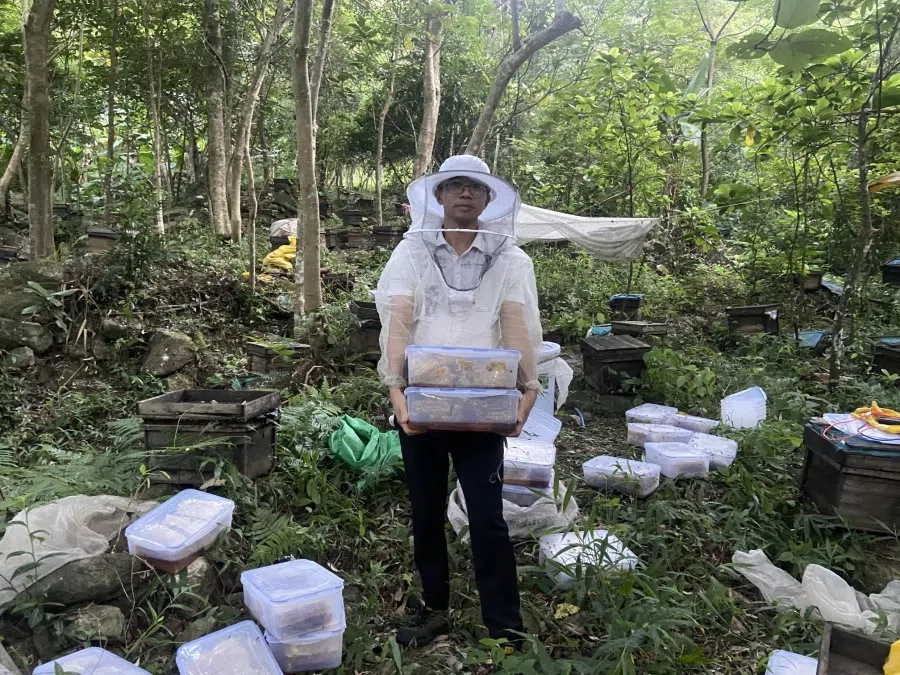[Big read] Are rural areas a paradise for China's youths?
Battered by the pressure of urban living and the difficulties of landing a job as economic growth slows, heading to the countryside in pursuit of a slower pace of life is gaining traction among Chinese youths. However, most of the country's rural areas still lack vitality and employment opportunities are in short supply there. Is a return to the villages really a better way out for Chinese youths, or are they doing so because they have no other choice?

After a decade of working in the city, Liu Bin left his job at a tech company in Shanghai in 2022. In March 2023, he moved to a village in Fujian to lead the rustic life that he had been wanting for some time.
In a rented 100-square-metre second-floor attic in Qiantou village, Xiling township, Ningde city, amid lush mountain forests and flowing waters, Liu opened the Mingxin Book Cafe (明心书屋) at a cost of 1,000 RMB per month (US$140).
Book cafe in a village
Liu, 33, used to work in software development in Hangzhou and Shanghai. In 2021, at the peak of retrenchments by Chinese internet giants, he left Hangzhou for Shanghai. But after experiencing various city-wide lockdowns in Shanghai, Liu was even more convinced that an urban lifestyle was not for him.
In an interview with Lianhe Zaobao, the northern Suzhou native said, "I come from a rural area, and there is a huge price to pay in living in the city. There is an uncertainty to urban living... I can't possibly go on renting after getting married and having children. Housing rentals and loans, healthcare expenses, and education are all very costly."
A common mindset among Chinese youths working in urban areas is that even a lifetime of slogging may not be enough for them to settle down in the big cities.
In contrast to the fast pace and high cost of living in big cities, the natural beauty and lower living costs in Qiantou village convinced Liu to settle there to carve out his ideal life.
Other than the rental for his book cafe, Liu's current monthly expenditure is only around 1,000 RMB.
He said the lower cost of living gives him greater control over his time to do what he wants. "When I don't feel like working, I can read, draw, write poems, or participate in communal activities instead. My rural neighbours are also very easy to get along with."
Increasing number of 'digital farmers'
As Chinese society becomes more "involuted", stress brought about by both unemployment and work is prompting more Chinese youths to move from cities to the countryside in pursuit of a stress-free, tangping (躺平, "lying flat") lifestyle.
However, Liu does not feel he chose rural living in order to tangping; he says it was a switch to a lifestyle he wanted.
"After all, I still need to work," Liu explained. The 100,000 RMB he invested to start the book café is his first start-up in the village. As Qiantou village is still in the early stages of its development, it is still not as happening as others in the vicinity, so he has more down time.
... among the "digital farmers" on Douyin, 62.96% received tertiary education and 33.33% have at least a master's degree.

While there is no public data on the number of Chinese youths who moved to the countryside in the last few years, the shift has become a new trend among youths on social media platforms like Douyin and Xiaohongshu. Many youths identify with and discuss content on everyday life in rural areas created by internet celebrities, with some posts attracting billions of views.
According to a report published in April by the Research Centre for Rural Economy (RCRE) of the Chinese Ministry of Agriculture and Rural Affairs, there were over 40,000 san nong (三农, in reference to the Three Rural Issues of agriculture, rural areas and farmers) content creators on Douyin as of December 2021.
Among them, the biggest group comprises white-collar workers who had returned from the cities to start new businesses at 21%, while migrant workers and undergraduates accounted for a further 17% and 13% respectively. In terms of age, 54% of these content creators are youths between the ages of 31 and 40 who have returned to their countryside homes.
Zhang Jing, a RERC assistant researcher in charge of the report, told China Newsweek that among the "digital farmers" on Douyin, 62.96% received tertiary education and 33.33% have at least a master's degree.
More than 70% of youths surveyed prefer the countryside
In a survey of 2,007 youths by the China Youth Daily last year, more than 70% of the respondents found the countryside more attractive, primarily due to the slower pace of living, lower stress from competition and cheaper living costs.
As a new generation of Chinese youths heads to the countryside, some do so in pursuit of better lifestyles, while others seek growth opportunities in less developed villages.
Zhao Yanjun, 33, is from Yaozu village in Shaoguan, a city in northern Guangdong. When interviewed, Zhao said he returned home to work primarily because he saw the market potential of the local agricultural products and liked countryside living, and also due to sentiment towards the lands of his forebears.
Business out of bees and honey
After graduating from university, Zhao found a job in e-commerce at an internet company in Guangzhou. During his time in the role, he learned that his hometown of Luokeng is a designated national nature reserve. With its vast forests that house a rich variety of plants, the honey produced by bees reared deep in its woods is rich in amino acids and highly nutritious. However, offline retail channels alone did not generate much sales or raise prices.
... he now owns six such farms and his farms have been designated by the government as a beekeeping demonstration base for the Yaoshan region.
In 2015, Zhao decided to head home to start his own business. Using his background in e-commerce, he helped local farmers boost the sales of their products. He said, "I studied sales and marketing, and e-commerce was booming, so I wanted to help the farmers back home get on board too."
Through his efforts, agricultural products from Luokeng are now sold throughout China and sales of honey by its dozens of beekeepers are basically taken care of.

Building on his initial success, Zhao pivoted to set up his own bee-rearing farm and honey-packaging facility. After five years of hard work, he now owns six such farms and his farms have been designated by the government as a beekeeping demonstration base for the Yaoshan region.
A government campaign to revitalise the countryside
Slowing economic growth, high youth unemployment, and a countryside that is losing its vitality have prompted the Chinese government to encourage young people to go to the countryside and build up rural areas.
In June, the unemployment rate for Chinese between the ages of 16 and 24 soared to a historical high of 21.3%. Subsequently, the government stopped announcing such data.
The employment outlook for Chinese youths remains challenging. In 2024, 11.79 million Chinese youths are expected to complete higher education, an increase of 2% from this year. The record number of graduates and slowing economic growth means that even more people will face employment pressure.
At last year's Central Rural Work Conference, Chinese Communist Party General Secretary Xi Jinping called on government officials to direct university graduates to the countryside and allay their concerns so that they would stay on in the countryside and even start new businesses.
Rural grassroots work for less pay?
With a large number of unemployed youths and a dearth of jobs in the country, some Chinese graduates have chosen to enrol in the highly competitive civil service examination for a chance to take on grassroots work in challenging rural locations for career breakthroughs.
To alleviate job-seeking pressures, many Chinese provinces have increased their recruitment of civil servants. According to figures from Caixin, the Chinese government recruited 16% more employees in 2023 as compared to 2022. In particular, the provinces of Gansu, Yunnan, and Guangxi recruited 50% more civil servants in 2023 as compared to 2022, with grassroots positions in villages accounting for the bulk of the increase in a bid to draw young people to the countryside.
In autumn, he goes on patrols to identify fire hazards in the forests and mountains; in winter, he visits each house to check heating facilities to prevent gas poisoning.
Twenty-three-year-old Meng Jie (pseudonym) is a university graduate who took the 2022 civil service examination, where he outperformed more than ten other people to be eligible for an "iron rice bowl" job in rural grassroots work.
Meng said his work is mainly to look after the safety of the village and its people. In autumn, he goes on patrols to identify fire hazards in the forests and mountains; in winter, he visits each house to check heating facilities to prevent gas poisoning.
Meng's job is unrelated to what he learnt in university and the salary is far below his expectation. Presently, he earns around 3,500 RMB a month which is below the average monthly pay of 5,990 RMB that a university graduate of the 2022 cohort earns, according to official figures.
Speaking frankly, Meng said, "There is a gap between reality and dreams, but that is not the main issue."
As one who grew up in a big city, Meng is unused to the spartan rural living environment and lack of recreational options. He said, "Two people living together in a dormitory makes it inconvenient to keep pets, and there are few restaurants here to choose from."
To make life more comfortable and to house his adopted pets, Meng spends 1,500 RMB a month to rent a place in town. On weekends, he also drives over two hours into the city to meet his friends, in a small car sponsored by his parents.
Meng is somewhat hesitant about whether he would soldier on in the countryside. He said, "It is not that I dislike my job, but I feel that I cannot keep on doing this."
Not all youths are desperate
When interviewed, Tan Gangqiang, the head of a psychology consultation centre in Chongqing (重庆市协和心理顾问事务所), said the growing number of Chinese youths looking forward to or who have returned to live and work in the countryside reflects two mindsets.
The first is desperation brought on by a lack of options. Tan explained that some of these youths face difficulties in the cities; in particular, university graduates who cannot find employment due to the lack of jobs, and have to retreat to the countryside where living costs are lower to save themselves.

The second is an active move. He said some young people may realise that urban living is not for them, and when there is a fresh option, they go somewhere better for their growth and head to the countryside on their own accord.
Many local governments are also providing various forms of support to youths who are looking to start new businesses in rural areas.
Guangdong mobilising more than 300,000 youths
In February, the Guangdong authorities rolled out a three-year action plan to encourage its youths to head to the countryside. By the end of 2025, it hopes to have mobilised more than 300,000 youths to support the development of the rural regions.
During this year's job-hunting season, nine government departments, including the Ministry of Agriculture and Rural Affairs and the National Development and Reform Commission, published a joint statement urging recent graduates to return to the countryside, establish a business with their skills, and play a part in revitalising the countryside.
Many local governments are also providing various forms of support to youths who are looking to start new businesses in rural areas. For example, book cafe owner Liu Bin said he was able to settle down very quickly into his new life partly due to the customised support measures available for youths like him that help them through each step of the entrepreneurial journey.
Liu said, "I make the drip coffee, ice cream, and snacks in my cafe. I learned to make them from free training lessons after I came to the village."
To ensure that young people have jobs to do and businesses to start, the village also teaches basic entrepreneurial skills, such as personal media management and events planning.
In recent years, with some big names in the arts taking the lead, Qiantou village - where Liu lives - and other old villages nearby have started developing their cultural and creative sector, going from empty villages to popular online spots for tourists and art lovers.
A good way out for youths?
Many young people leave the cities for the countryside to postpone their job searches. However, given the lack of commercial activities and employment opportunities in the rural areas, is going back to the countryside a long-term solution for most of them? Can their contribution truly resolve the issue of empty villages?
A Hebei native surnamed Wang came home 14 years ago to start a business. When interviewed, he said conditions at the village he lives in have improved from ten years ago, but few young people have come back and settled down.
The large investments and high risks also mean that it is very difficult for cash-strapped, inexperienced youths to successfully start businesses in rural areas.

He said that currently, the top earners in his village only make 2,000 to 3,000 RMB each month, which is why young people are unwilling to return to work in low-paying jobs.
Citing his own entrepreneurial experience, Wang said he was the youngest entrepreneur in the village when he returned in 2010. "I remember a 60-year-old was vying with me for a piece of land."
Even after over a decade, he is still the youngest business owner - most of those involved in agricultural work in the village are over 70 years old. "Those below 65 years of age have left to work in the cities; would there be any young people left?"
While jobs are scarce in the countryside, starting a new business there is even tougher. Wang said village and farming services remain underdeveloped, while the ageing rural population is a severe issue. The large investments and high risks also mean that it is very difficult for cash-strapped, inexperienced youths to successfully start businesses in rural areas.
In recent years, as development accelerates in the Chinese countryside, a growing number of its 490,000 administrative villages are turning their natural landscape into sources of income and drawing young people to come back; however, in most rural areas, it is still difficult to get young people to stay.
Few jobs, poor infrastructure, and low income
Chen Jingjing is a research group member at the Centre of Consultation for Farmers' Associations in Beijing and the founder of a management consultancy. In an interview with Lianhe Zaobao, he said job opportunities in the countryside are also dwindling. Not only that, there is still a gap between rural areas and cities in terms of public service standards, infrastructure, and income levels, so it is unrealistic to expect more university graduates and youths to go to the countryside to start new businesses and settle down there in the short term.
He said that for the rural areas to attract and retain youths, they need to be better developed than cities. "Young people will only return and settle when the countryside is more developed, and provides better living conditions and more employment opportunities."
This article was first published in Lianhe Zaobao as "中国青年下乡寻找"市外"桃源".



![[Video] George Yeo: America’s deep pain — and why China won’t colonise](https://cassette.sphdigital.com.sg/image/thinkchina/15083e45d96c12390bdea6af2daf19fd9fcd875aa44a0f92796f34e3dad561cc)
![[Big read] When the Arctic opens, what happens to Singapore?](https://cassette.sphdigital.com.sg/image/thinkchina/da65edebca34645c711c55e83e9877109b3c53847ebb1305573974651df1d13a)
